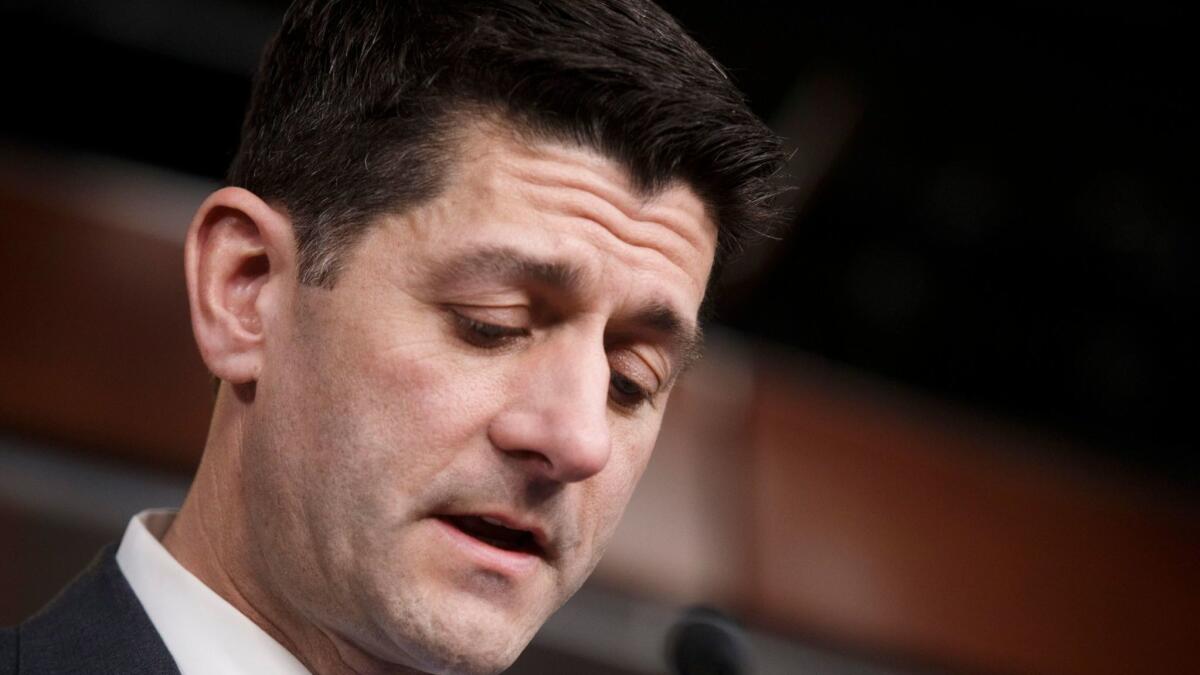Editorial: Paul Ryan came in as a ‘young gun’ with big ideas. He’ll leave as a pushover

House Speaker Paul D. Ryan is leaving Congress before the harsh light of reality can reveal how little he’s accomplished. And, sadly, he’s leaving the office of speaker in the same hobbled place it was when he took the job 2½ years ago.
Ryan (R-Wis.) fashioned himself as an ideas-driven conservative, eager to apply small-government solutions to Washington’s biggest fiscal problems. He was one of the self-described “Young Guns,” a new, more youthful crop of leaders that was supposedly taking the Republican Party to new heights — intellectually and politically. And he proved adept at winning support from his House GOP colleagues, even when his ideas were politically toxic — such as transforming Medicare into a program of insurance subsidies that wouldn’t keep pace with rising medical costs.
When Ryan was tapped by GOP presidential candidate Mitt Romney in 2012 to be his running mate, it was a Triumph of the Wonks moment — the elevation of someone known not for political skills so much as his policy chops.
But when it came to translating ideas into law, many of Ryan’s ambitious proposals never made it past the roadmap stage. That’s particularly true of his signature issue, entitlement reform. Members of Congress who were ready and willing to vote for nonbinding, conceptual 10-year plans to wind down the federal deficit by slashing tens of billions of dollars from Medicare and safety-net programs weren’t quite so eager to take up the legislation necessary to put such changes into law.
Instead of driving the legislative agenda for GOP-controlled Washington, Ryan’s House has gotten embroiled in one Trump-directed sideshow after another.
It takes political courage and determination to change entrenched programs, even one with the fiscal challenges that Medicare faces. And Ryan had a golden opportunity to be part of such an effort in 2012, when he was an influential member of the bipartisan National Commission on Fiscal Responsibility and Reform (better known as Simpson-Bowles). The group developed a credible, bipartisan plan to bring down the deficit and improve federal finances. But Ryan wanted to go further on entitlements, and his opposition helped sink the deal.
Granted, we’re not shedding any tears over Ryan’s failure to turn his personal vision of government into reality. Too often his proposals reeked of Ayn Rand-style ideology rather than Rand Corp.-caliber scholarship. He seemed far more interested in cutting the cost of federal safety-net programs than in reducing the need for them.
But at least he was swinging for the fences for a while. That stopped when he took over as speaker late in 2015 — reluctantly, in light of the factionalism that had made House Republicans painfully difficult to lead. Since then, he has managed to keep his unruly majority from shutting down the government or defaulting on the federal debt, as some of its members have frequently threatened to do. But he hasn’t found a way to keep a disaffected and stubborn cadre of archconservative members, collectively known as the Freedom Caucus, from defining the agenda. Like erstwhile Speaker John A. Boehner (R-Ohio), Ryan coddles the Freedom Caucus by rarely bringing up bills that aren’t supported by a vast majority of Republicans, regardless of how broadly they are backed in the full House.
The consequence is that big problems have gone unaddressed, even when mainstream solutions are available and have wide support in both parties. Providing permanent relief for “Dreamers” is an example, as are improving border security, reducing health insurance costs and prescription drug prices, and drawing clearer rules for the use of military force against terrorist groups in the Middle East and Africa.
Instead, Ryan’s main accomplishments as speaker — slashing tax rates and busting open the budget caps he helped negotiate in 2011 — are the legislative equivalent of skipping dinner and going straight to dessert. Such costly acts of largesse are a piece of cake in comparison to the tough work of overhauling immigration laws or reining in healthcare costs.
Even had Ryan accomplished nothing as speaker, he could still have been a successful leader had he taken a principled stance against the barrage of lies, distortions and attacks coming from President Trump. Unfortunately, he has chosen the easier path on that as well.
Ryan has not only muted the infrequent critiques he’s offered of Trump’s outrageous behavior, he’s given his committee chairmen free rein to pursue conspiracy theories involving the Obama administration and Hillary Clinton (The Deep State! Illegal surveillance! Violations of privacy!) rather than doing any real oversight of the current administration’s blatant conflicts of interest, disregard of the law and abuses of taxpayer funds. Instead of driving the legislative agenda for GOP-controlled Washington, Ryan’s House has gotten embroiled in one Trump-directed sideshow after another.
The House has all but punted on any significant legislative action for the remainder of Ryan’s tenure. It’s probably too much to ask of Ryan to defend his institution more vigorously against Trump’s bullying and to reduce the factionalism and partisan vitriol that are diminishing the House’s standing. Instead, that work will await the speaker the House elects next.
Follow the Opinion section on Twitter @latimesopinionand Facebook
More to Read
A cure for the common opinion
Get thought-provoking perspectives with our weekly newsletter.
You may occasionally receive promotional content from the Los Angeles Times.










